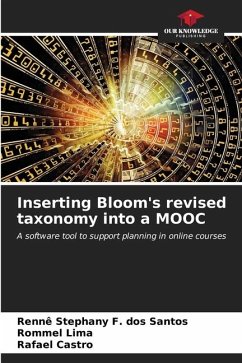In recent years there has been a huge expansion in MOOC (Massive Open Online Courses) courses, democratically favouring people seeking professional qualification and updating. In this scenario, various platforms and providers have emerged offering courses, most of them from world-renowned universities. Among the problems observed in MOOCs is the lack of pedagogical support tools to help teachers plan courses, as well as high dropout rates, especially due to the heterogeneity and cultural diversity of their participants. In order to alleviate these problems, a revised version of Bloom's theory of educational objectives has emerged, supporting new ways of designing courses to achieve the best possible results. Therefore, this book presents a study of MOOCs and applications of this new Revised Bloom's Taxonomy, thus resulting in a platform and a pedagogical tool that guides the teacher in planning a MOOC course in order to achieve the expected educational objectives.








